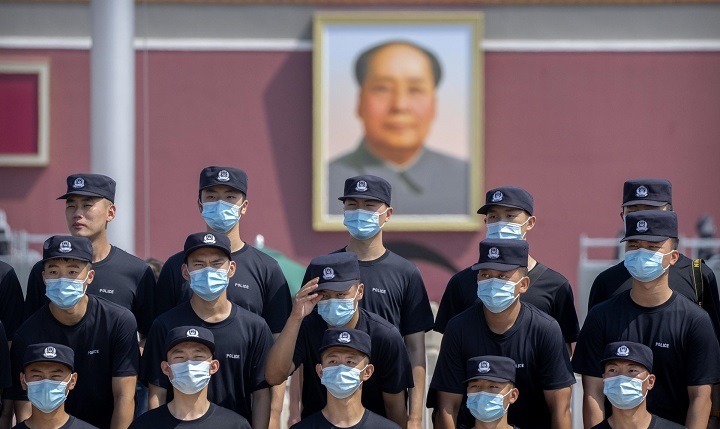
When the Communist Party of China celebrates its 100th anniversary on July 1, it will have plenty to be proud about. But actually most of its pride, and the money lavishly spent on fireworks and parades, will come from what the party did in the past four decades, not what it did in the time before that. In the preceding period, the party fought to gain power, and after that, it closed the country and pursued lofty but impractical ideals that made common Chinese people extremely poor and scared to speak up.
Four decades ago, the party changed tack completely: It opened up, engaged with the United States and the world where the US was the leader, and implemented massive reforms that afforded the party its present pride in its achievements.
Still, after the glow of the lights fades on July 1, one will have to ask where the party and the China it leads will be in ten years. Long gone are the times when the world was drawing linear projections of growth for the country. The next decade will definitely have in store many political snags that do not come up in the economists’ charts.
So, to look at the future, first let’s turn to the past.
Around the year 2005, it was clear to some the need to maintain and manage democracy in Hong Kong because otherwise the situation would explode in about a decade[1].
Already in 2005, the people of Hong Kong could not hope to increase their salaries, which were already as high as developing countries. They could not hope to strike it rich, because all the “rich” positions in Hong Kong were held by friends of Beijing. Moreover, local people were being marginalized, as competition from the Mainland was pouring into the territory. Then Hongkongers would feel poorer and more sidelined in a few years, and the only way to manage these issues was to give the territory democracy.
A vote promises change, and allows citizens to vent grievances, even if little or nothing comes out of the vote. In a situation where any change in favor of the people of Hong Kong was difficult, the people at least were to be given hope for change. If even that hope was taken away, then there would be an explosion. This was the argument recommending cultivating democracy in the former British colony.
Beijing in fact had troubles in the territory, but its response has been to close Hong Kong further down, which has stopped the short-term issues of Hong Kong. But the crackdown has created larger problems by removing the many fig leaves hiding the situation and exacerbating tiffs between China and the outside world.
Similarly, around 2007, there was talk that China might encounter a series of troubles around 2020. Around that year, China would stretch its finances to try to meet growing welfare demands from society and thus would face pressure to raise taxes; China’s trade surplus would increasingly weigh on global commerce; China’s GDP would catch up with US GDP, arousing global concerns about a different global order and worries from America. And there would be the 2022 party congress, stretching the bounds of the two-term limit set two decades earlier.
In this case also, a process of democratization could have helped ease these issues.
The actual response has been to expand internal debt to finance growth and the welfare system; keep China’s economy closed, despite protestations from abroad; and finance the domestic debt not through a new tax system but through a growing trade surplus and a massive spread between interest on deposits and loans on the huge deposits of Chinese savers (about 50% of the GDP). American and foreign concerns that China’s rise would upset the existing global order were also dismissed.
Now all of these issues are falling hard on China.
China is presently at a dead end, as it has put itself in a corner. In fact, in the present confrontation with the United States, there are possibly two outcomes.
One, China wins and then the United States falls apart. But if the United States falls apart, so does the global order surrounding and built by the United States, and thus the system that allowed China to grow and thrive in the past 40 years. China is not ready to pick up the pieces of this world, establish a different global order, and replace the United States in its present role. If it prepares to replace the present political-economic global order, China will have to face many things, starting with a fully convertible currency, which it presently doesn’t have. And if it did prepare to replace the current order, it would hasten and worsen competition with the US-led order as China would exactly take the place of the USSR in the first Cold War.
Moreover, after a possible fall of the United States, if China doesn’t prepare to be the political-economic leader, the world around China would be without an effective center and possibly it would be poorer. In that world, Chinese companies might have less to gain, and the overall Chinese economy could face very difficult times.
On the other hand, there is the possibility that the United States succeeds and China could crumble, and that of course wouldn’t be good for China either.
That is, China has before itself no good choices. In theory China should try to find a way out of the current corner.
Presently, in fact, China is not totally undermining the American-led order, as David Goldman wrote[2]. Beijing is buying dollars, and therefore supporting the global financial order, because Beijing knows that if the RMB appreciates too much, China exports will dwindle and there will be little surplus to finance its imports of raw materials and its domestic debt. Moreover, there are only so many currencies available for that: euros, dollars, or Japanese yen, and they are all linked to a dollar-centered system. Therefore, Beijing needs to support a global financial order to pay for its needs and its internal growth. It also needs existing foreign markets to buy its goods—without exports the whole economic system in China would fare not so well.
In fact, China is in this situation because for 40 years it went on planning economic growth mechanisms but failed to plan for internal and external political evolution. China thought of changing its economic system and improving it, but failed to look at politics. Conversely, it also knows that politics is of paramount importance compared to the economy.
Therefore, its failure for some 20 years to plan for political changes and reforms was a deep fault that eventually led China to the situation of the present day. This failure of perceptions is at the heart of the present Chinese predicament. If Beijing doesn’t address it as soon as possible, it will only dig its hole deeper and deeper, and it will be harder to get out of.
In the past few days, Vice Premier Liu He has been put in charge of setting up China’s next technological revolution. This decision underlines the existing technological decoupling the US has been driving for a couple of years. It is uncertain whether China can win this technological race. China graduates millions of engineers from its universities, far more than American universities.
Still, the US has a world of engineers to draw from. Scientists from all over the world are being drawn to the US to help kickstart America’s next technological revolution, financed by a $250 billion fund. This can be an accelerator of technological decoupling. Plus, its gargantuan plan for infrastructure in the developing world (B3W, Build Back Better World) may squeeze China out of many markets.
China can choose to fight toe-to-toe with the US initiatives, but if it wins, it will have a world very different from the one it needs to carry on developing. If it loses…it’s lost. Then what Beijing really needs is to bring back fast the agenda of political reforms before it is too late. It shouldn’t be too difficult if it manages to realize the situation around the country. After all the Party is mainly about politics, not economy. But what reforms? Ah that is very difficult, all our best wishes Mr Party.
[1] See also “Beijing’s great Hong Kong experiment” and “China’s Inevitables: Death, taxes—and democracy” in my In the Name of Law https://www.amazon.it/China-name-law-global-order/dp/8867974904 I also want to thank Pansak Vinyaratn who was involved in some of our discussions about China’s future.
[2] See https://asiatimes.com/2021/06/china-struggles-to-hold-back-yuan-appreciation/






When the US hegemony collapse, the World will not need a new one as assumed by this author. The smaller countries can thrive by themselves. The UN is an organizational platform ready for this function. China is the leading trading partner of most nations in this planet, including the US, EU, Japan, India. The World does not a world currency which can be printed at will.
China builds roads, ports, railways to move goods in many countries because it wants to trade with them. If the G7 can do some of it, so much the better. To begin with, G7 should help India completing the Japan speed train project whihc was due to run in 2022.
The US has rejected the Charter of the United Nations (no interference in the internal affairs of other countries) and instead promotes the ‘International Liberal Rules Based Order’ in which only the US determines the rules and changes them as ‘necessary’. Despite the name being introduced only some five years ago that is the way US acted ever since 1945. Think of the regime change in Iran in 1953 when it established the Shah dictatorship, the wars against Vietnam and Afghanistan, scores of smaller wars and coups which together cost the lives of many millions of people and did huge damage to the countries attacked.
It would be wrong for China to take over that role and indeed it has said it doesn’t want to. The Charter of the United Nations contains the mechanisms to interfere in wars if that is necessary. Besides we have to invest in preparing to live in the world after climate change so should not waste so much on wars.